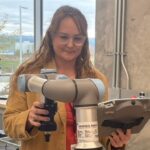Forget the hard sell — soft skill competencies may be the secret to hiring success.
When it comes to educating emerging business leaders, the worth of a well-developed set of hard skills goes without saying: competency in accounting and finance plus management and strategizing expertise and a readiness to work with big data are the proven bedrock upon which well-rounded modern MBA programs are built.
But in this era of crumbling professional silos, pure practical know-how won’t get you all the way to the top. Rising high requires a firm grounding in softer skills, too — things like effective communication, deft negotiation and the ability to manage projects across cultures and even industries.
It’s a high bar to clear, notes Lori Heino-Royer of Daimler Trucks North America, and an MBA who ably scales it from day one is a real prize.
As Director of Daimler’s Business Innovation and Project Management Office, Heino-Royer spends ample time selecting and onboarding new hires. And like any leader worth her salt, she devotes substantial energy to helping her people hit peak potential.
But a new employee who arrives pre-equipped with a broad frame of reference and tireless initiative is likely to deliver lasting value to an organization, she says, and the rest can be taught: “I’m looking for students and new employees who tell me what their opinion is. Who are confident enough to say, ‘I did some research, and here are three ways a problem can be solved, and three drawbacks to each solution.”
Heino-Royer honed her own professional toolkit a decade and a half ago at the Portland MBA Program at Portland State University’s School of Business — and with Portland State University ranking the country’s ninth most innovative school in 2016 by U.S. News & World Report, the results spoke for themselves.
An emphasis on skillful rapport building and a blend of hard and soft skill training are both integral to the Portland MBA’s current approach, notes Program Academic Director Tichelle Sorensen.
Leveraging rapport is definitely essential when you’re training in a city at the locus of countless interconnected industries, she says: “I don’t think I’ve ever received a single job in Portland area that was me filling out an application and sending a resume. It’s always been because of somebody I’ve met that’s introduced me or who connects me with someone.”
At PSU, those connections are forged right in the classroom, amongst a cohort of fellow students diverse in origin and experience: up to 50 percent of full-time MBA students come from outside Oregon, bringing 5-7 years of work experience with them. This diversity encourages the incubation of big ideas, which are subsequently shaped into post-graduation partnerships and professional relationships.
Of course, to stay competitive, notes Heino-Royer, you’ve got to back up all that talk with smart strategy, and this means seeing beyond current opportunities and challenges to the opportunities and challenges waiting just beyond the horizon.
Heino-Royer chases that horizon by maintaining close ties with PSU, where she currently sits on the Alumni Association Board of Directors, among other involvements.
It’s all in the service of staying dynamic, she says: “The situations that we deal with are definitely much more complex than they ever were before. If you were to only apply the same basic tools that we learned when I was in MBA school 16 years ago, I don’t know that we’d get very far.”
Encourage constant conversation among MBAs, the universities training them, and the leaders hiring and shaping them, says Sorensen, and you nurture a readiness to communicate tirelessly in the service of creative problem solving, no matter what challenges await around the bend: “The world is changing very quickly. You need to be flexible and nimble enough that you can respond to that change.”






